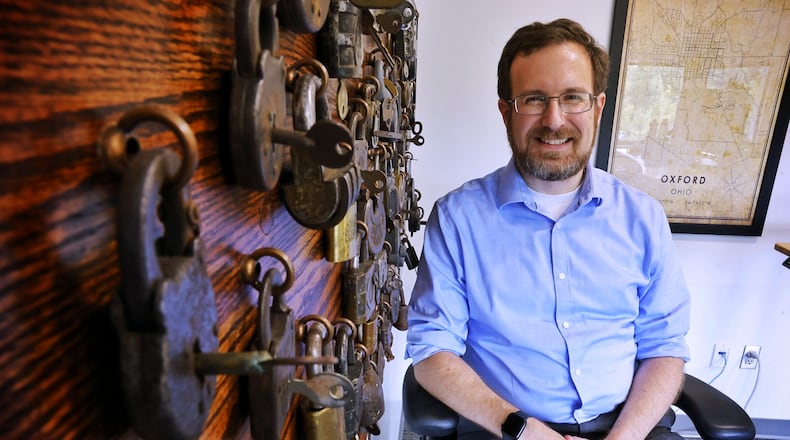Seidl, a former professor and now school official, invites students, staffers and others visiting his campus office to try their hand at lock sport to pick open the artifacts.
Many take him up on it by fiddling with his deceased grandfather’s locksmith collection that first lured him into the pastime.
The appeal is similar to that of anyone who has tried to solve a Rubik’s Cube or other puzzle game, he said.
“There is some puzzle quality to it, and it’s also a kind of manual dexterity training,” said Seidl, who supplies basic lock-picking tools to anyone who is game to try.
Picking open a lock is an exercise in “focus and patience” he said, adding the practice also builds a “desire to learn because you have to learn different techniques to open locks.”
Most of his fellow hobbyists around the country are cyber security specialists and their passion for lock sport isn’t much of a stretch, he said. Moreover, there is a vibrant online video community where lock sport becomes a timed competition among fans.
“One of the reasons lock-picking is really common in information security (profession) is that security professionals tend to be consistently curious,” he said. “And lock-picking is a thing where if you are curious about how things work — and curious about how things can be made to fail — lock picking is a thing that might appeal to you.”
His collection was recently the focus of an article in EDUCAUSE, a nonprofit organization that works to advance higher education through the use of information technology.
Seidl collaborated with John O’Brien, president of EDUCAUSE, to pen “Lockpicking Lessons for Leaders,” an article that explores how lessons learned from their shared enthusiasm for locksport also apply to leadership skills.
“Slow down. Break the problem down into steps and then work the problem,” O’Brien said. “I think I do my best problem-solving with a lock in hand. And it’s fun.”
But the hobby comes with a big caveat: Any skills learned cannot be used for crime, said Seidl.
“I would tell my students two things. If you come during office – and you want to – I will teach you to pick locks.”
“But I’m going to make you also promise you will not abuse this because if you abuse it, I will tell every student after this you are the one – by name – who cost them the chance to learn how to pick a lock.”
“No one has ever used the lock picking for evil … and I got a lot more students to come talk to me when I was a professor.”
And there is good reason, he said, almost every computer security program displays some sort of logo of an old-fashioned lock.
Lock sport hobbyists joke, said Seidl, that “every cyber-security thing has a lock logo somewhere in it.”
About the Author


